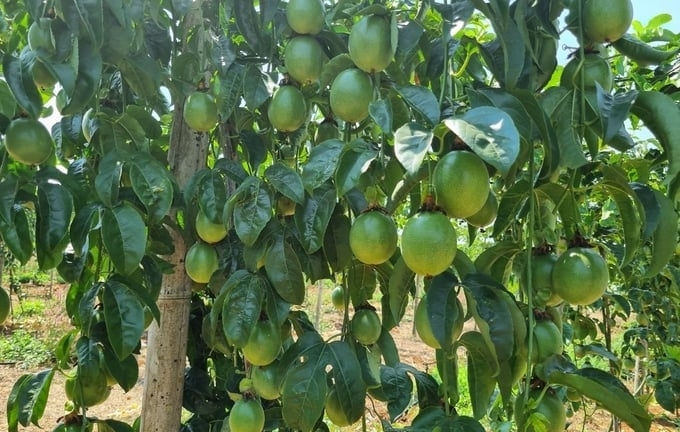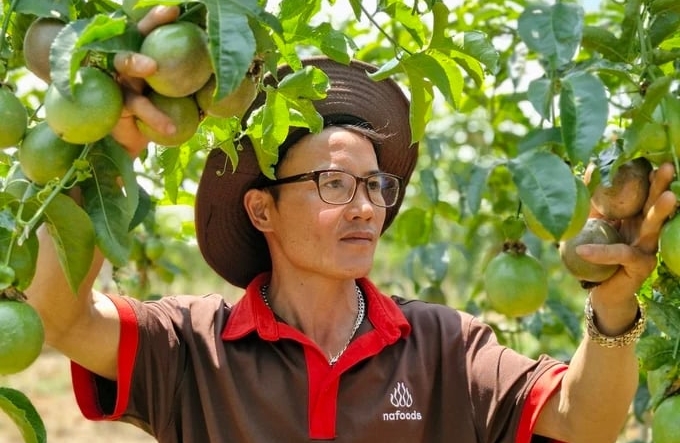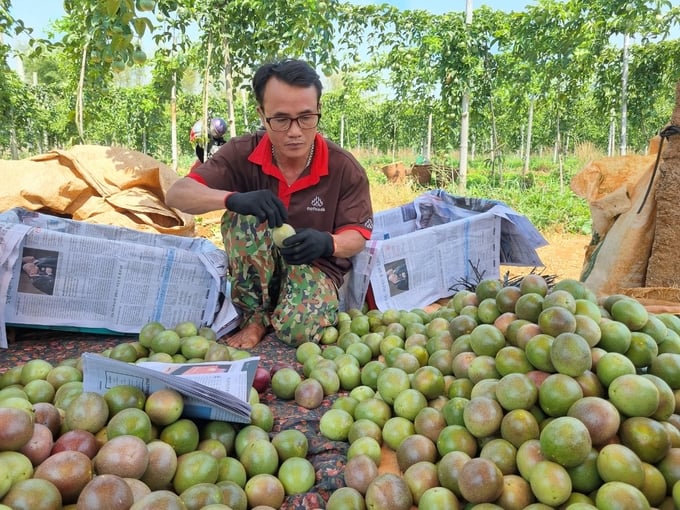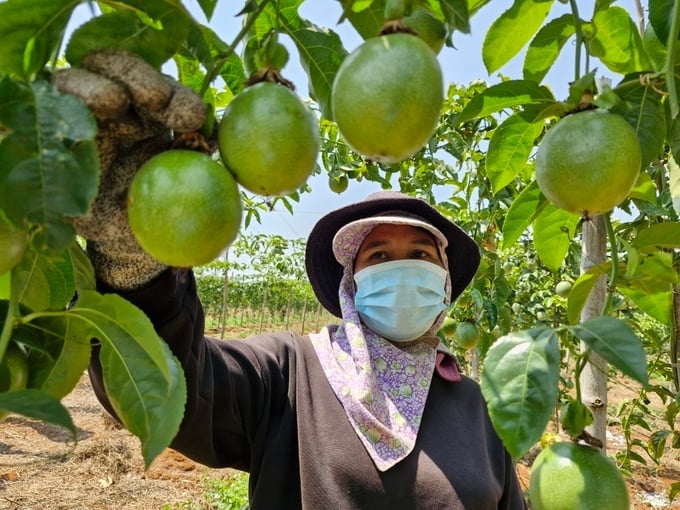November 26, 2025 | 00:17 GMT +7
November 26, 2025 | 00:17 GMT +7
Hotline: 0913.378.918
November 26, 2025 | 00:17 GMT +7
Hotline: 0913.378.918

Mr. Toai's passion fruit garden is admired by people. Photo: Tuan Anh.
Recently, in Gia Lai province, many passion fruit areas had to be destroyed because of raging epidemics. The garden of Mr. Bui Van Toai's family, Thong Ngo village, Ia Kenh commune, Pleiku City, Gia Lai province, still gives stable output. Not only that, his family's passion fruit is also regularly exported to the European market, several dozen tons each year, earning billions of VND.
Mr. Toai's passion fruit garden is about 10km from the center of Pleiku City and is praised by neighbors as "very beautiful." The garden is about 4 hectares large, located on flat land, looks no different from an eco-tourism area, and is elaborately designed.
The garden is planted in straight, even rows. The garden frame is reinforced with concrete pillars according to standards; each tree is 1.2m apart, and each row is 8m apart. Below the garden is an entirely automatic sprinkler irrigation system.

Mr. Toai at the passion fruit garden meets export standards to Europe. Photo: Tuan Anh.
Mr. Toai's family's passion fruit garden is entering harvest time this May. Mr. Toai said wanting to export products to foreign countries requires many standards, especially ensuring food hygiene and safety.
After five years of entering the field of passion fruit growing, Mr. Toai is still steadfast in growing organically, mainly using the family's available composted manure to fertilize the plants. Mr. Toai understands that for passion fruit to sell at a high price, it must be exported to Europe. To do so, we must grow organically, ensuring that passion fruit does not contain pesticide residues.
"Up to now, the family only uses composted manure, organic fertilizers, and biological products of clear origin, so they don't worry about pest attacks. In particular, the family's garden does not use chemicals to ensure it meets export standards to Europe," Mr. Toai said, adding that using composted manure will help the passion fruit be beautiful, thick-skinned, and of good quality better quality.
In addition to using organic fertilizer, Mr. Toai's passion fruit garden also ensures coolness and enough sunlight to help the trees and fruits grow well. The sprinkler irrigation system is meticulously invested to ensure adequate garden water coverage.

Mr. Toai carefully selected passion fruit before exporting it to Europe. Photo: Tuan Anh.
For passion fruit to meet European export standards, variety selection is also essential. After a research period, Mr. Toai decided to associate with Nafoods Group to receive guidance on the care process and the selection of seedlings.
"Because of the investment in organic farming to export to Europe, the cost of the garden is also higher than the average, fluctuating about VND 250 million per hectare. In return, the quality is better, and the passion fruit easily meet European market standards," Mr. Toai shared.
Every year, Toai's passion fruit garden exports about 60 tons of fruit to Europe. The selling price of type 1 passion fruit exported to Europe is VND 45,000 per kg, and that of type 2 is about VND 30,000 per kg. Minus expenses, on average, each hectare of Toai's garden has a profit of more than VND 200 million.
With the success of the organic passion fruit growing model for export to Europe, Mr. Toai has been sought by many people to learn from his experience. Mr. Toai enthusiastically shared farming methods from diary records, the use of pesticides, and the application of advanced irrigation technology, pest management, etc.
Since then, many households have applied passion fruit production according to the care process, like Mr. Toai's family, and gradually achieved success.

Mr. Toai's family's passion fruit garden is visited and learned by many households. Photo: Tuan Anh.
Mr. Ho Hai Quan, Director of the Central Highlands Growing Region, Nafoods Group, said that recently, the company had promoted links with cooperatives and people in the Central Highlands provinces to produce passion fruit according to the requirements of importing countries. Mr. Toai's family is an affiliated member who receives seed support and standard care procedures from the company.
"Mr. Toai's family's passion fruit garden is cultivated uniquely, from organic care to planting density, and science and technology are applied to production. On the other hand, Mr. Toai's family's garden is located in an isolated area, not close to other gardens, so the disease is almost not spread despite adverse weather.
With this approach, Mr. Toai's family has greatly succeeded. Passion fruit is mainly exported to Europe at high, stable prices," Mr. Quan shared.
Translated by Huong Giang
/2025/11/24/3536-2-112800_176.jpg)
(VAN) Dong Nai now has tens of thousands of hectares of forests certified for sustainable management, and this area will continue to be expanded in the coming period.

(VAN) Vinh Ha hamlet (Dai Xuyen commune, Hanoi) is shifting away from small-scale farming as households adopt bioscurity into their breeder chicken models.

(VAN) Heavy rains make aquatic species more vulnerable to disease. Proactive water management and high-tech systems help farmers prevent outbreaks and protect yields.

(VAN) Greenhouses are shifting production mindsets in Binh Lu commune, enabling farmers to ‘weather the sun and rain’ and secure stable vegetable harvests throughout the year.

(VAN) Green transition is crucial for the Mekong Delta amid climate change and stricter standards, offering a path toward sustainability.

(VAN) Dong Thap promotes agricultural restructuring, forms large specialized farming zones, raises the value of agricultural products and develops toward ecological and high-tech directions.
/2025/11/22/4018-4-213342_747.jpg)
(VAN) The Mekong Delta Agricultural Experts Club has attracted 143 experts and researchers to participate in providing consultancy and contributing initiatives to the development of one million hectares of high-quality rice.